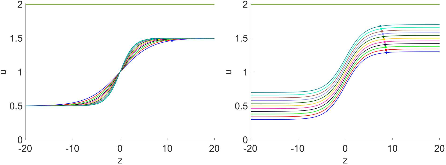Hyper-Differential Sensitivity Analysis of Uncertain Parameters in PDE-Constrained Optimization
Abstract
Many problems in engineering and sciences require the solution of large scale optimization constrained by partial differential equations (PDEs). Though PDE-constrained optimization is itself challenging, most applications pose additional complexity, namely, uncertain parameters in the PDEs. Uncertainty quantification (UQ) is necessary to characterize, prioritize, and study the influence of these uncertain parameters. Sensitivity analysis, a classical tool in UQ, is frequently used to study the sensitivity of a model to uncertain parameters. In this article, we introduce "hyper-differential sensitivity analysis" which considers the sensitivity of the solution of a PDE-constrained optimization problem to uncertain parameters. Our approach is a goal-oriented analysis which may be viewed as a tool to complement other UQ methods in the service of decision making and robust design. We formally define hyper-differential sensitivity indices and highlight their relationship to the existing optimization and sensitivity analysis literatures. Assuming the presence of low rank structure in the parameter space, computational efficiency is achieved by leveraging a generalized singular value decomposition in conjunction with a randomized solver which converts the computational bottleneck of the algorithm into an embarrassingly parallel loop. Two multi-physics examples, consisting of nonlinear steady state control and transient linear inversion, demonstrate efficient identification of the uncertainmore »
- Authors:
-
- Sandia National Lab. (SNL-NM), Albuquerque, NM (United States)
- Technical Univ. Chemnitz (Germany)
- Publication Date:
- Research Org.:
- Sandia National Lab. (SNL-NM), Albuquerque, NM (United States)
- Sponsoring Org.:
- USDOE National Nuclear Security Administration (NNSA)
- OSTI Identifier:
- 1618103
- Report Number(s):
- SAND-2019-10626J
Journal ID: ISSN 2152-5080; 679214
- Grant/Contract Number:
- AC04-94AL85000; NA0003525
- Resource Type:
- Accepted Manuscript
- Journal Name:
- International Journal for Uncertainty Quantification
- Additional Journal Information:
- Journal Volume: 10; Journal Issue: 3; Journal ID: ISSN 2152-5080
- Publisher:
- Begell House
- Country of Publication:
- United States
- Language:
- English
- Subject:
- 97 MATHEMATICS AND COMPUTING
Citation Formats
van Bloemen Waanders, Bart, Hart, Joseph, and Herzog, Roland. Hyper-Differential Sensitivity Analysis of Uncertain Parameters in PDE-Constrained Optimization. United States: N. p., 2020.
Web. doi:10.1615/Int.J.UncertaintyQuantification.2020032480.
van Bloemen Waanders, Bart, Hart, Joseph, & Herzog, Roland. Hyper-Differential Sensitivity Analysis of Uncertain Parameters in PDE-Constrained Optimization. United States. https://doi.org/10.1615/Int.J.UncertaintyQuantification.2020032480
van Bloemen Waanders, Bart, Hart, Joseph, and Herzog, Roland. Wed .
"Hyper-Differential Sensitivity Analysis of Uncertain Parameters in PDE-Constrained Optimization". United States. https://doi.org/10.1615/Int.J.UncertaintyQuantification.2020032480. https://www.osti.gov/servlets/purl/1618103.
@article{osti_1618103,
title = {Hyper-Differential Sensitivity Analysis of Uncertain Parameters in PDE-Constrained Optimization},
author = {van Bloemen Waanders, Bart and Hart, Joseph and Herzog, Roland},
abstractNote = {Many problems in engineering and sciences require the solution of large scale optimization constrained by partial differential equations (PDEs). Though PDE-constrained optimization is itself challenging, most applications pose additional complexity, namely, uncertain parameters in the PDEs. Uncertainty quantification (UQ) is necessary to characterize, prioritize, and study the influence of these uncertain parameters. Sensitivity analysis, a classical tool in UQ, is frequently used to study the sensitivity of a model to uncertain parameters. In this article, we introduce "hyper-differential sensitivity analysis" which considers the sensitivity of the solution of a PDE-constrained optimization problem to uncertain parameters. Our approach is a goal-oriented analysis which may be viewed as a tool to complement other UQ methods in the service of decision making and robust design. We formally define hyper-differential sensitivity indices and highlight their relationship to the existing optimization and sensitivity analysis literatures. Assuming the presence of low rank structure in the parameter space, computational efficiency is achieved by leveraging a generalized singular value decomposition in conjunction with a randomized solver which converts the computational bottleneck of the algorithm into an embarrassingly parallel loop. Two multi-physics examples, consisting of nonlinear steady state control and transient linear inversion, demonstrate efficient identification of the uncertain parameters which have the greatest influence on the optimal solution.},
doi = {10.1615/Int.J.UncertaintyQuantification.2020032480},
journal = {International Journal for Uncertainty Quantification},
number = 3,
volume = 10,
place = {United States},
year = {Wed Jan 01 00:00:00 EST 2020},
month = {Wed Jan 01 00:00:00 EST 2020}
}
Web of Science
Figures / Tables:
 FIG. 1: Plot of the constraint u in (7) as a function of z for different values of θ. Left: varying θ1 from 0.3 to 0.7 with θ2 = 0.5 fixed; right: θ2 varying from 0.3 to 0.7 with θ1 = 0.5 fixed. Each curve corresponds to a different θmore »
FIG. 1: Plot of the constraint u in (7) as a function of z for different values of θ. Left: varying θ1 from 0.3 to 0.7 with θ2 = 0.5 fixed; right: θ2 varying from 0.3 to 0.7 with θ1 = 0.5 fixed. Each curve corresponds to a different θmore »
Figures / Tables found in this record:

 Search WorldCat to find libraries that may hold this journal
Search WorldCat to find libraries that may hold this journal